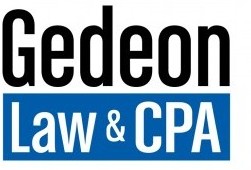In today’s day and age, investing or operating internationally is a lot easier than it’s ever been. As such, many individuals and businesses have started investing and doing business in foreign countries to take advantage of new markets.
At Gedeon Law & CPA, we work with a lot of US individuals and US businesses that have investment and business operations in Canada.
While technology has made it easier to take advantage of foreign markets, the tax code has not been so kind to those looking to invest or do business in Canada or elsewhere in the world.
For many individuals and businesses looking to invest or do business in Canada without the proper professional guidance, its only after the fact that they learn about the costly and burdensome US tax compliance obligations that await them in their foreign pursuits.
At Gedeon Law & CPA, we work closely with those looking to invest or expand their operations outside of the US so they are aware of the tax compliance pitfalls awaiting them as the failure to comply can be very costly.
As such, we put together the following overview of the potential filings that face U.S. citizens, resident aliens and US businesses who have investments or connections to foreign assets or foreign businesses:
Form 8858: Information return of U.S. persons with respect to foreign disregarded entities
A U.S. person that directly, indirectly or constructively owns a foreign disregarded entity (FDE) must file this form. An FDE is an entity that is not created or organized in the United States and that is disregarded as an entity separate from its owner for U.S. tax purposes. For example, a single member Unlimited Liability Company in Canada owned by a U.S. person would trigger filing this form.
Form 8865: Return of U.S. persons with respect to certain foreign partnerships
This form must be filed by a U.S. person who owned more than a 50% interest in a foreign partnership during the year or owned at least a 10% interest if the partnership was controlled by U.S. persons owning a 10% or greater interest. A U.S. person also has a filing requirement if he or she contributed property in exchange for a partnership interest if that person directly, indirectly or constructively owns at least a 10% interest, or the value of the property contributed exceeds $100,000.
Form 5471: Information return of U.S. persons with respect to certain foreign corporations
This form is filed by any U.S. person who is more than a 10% direct or indirect shareholder in a foreign corporation or any U.S. shareholder in a controlled foreign corporation (CFC), which broadly is a foreign corporation, more than 50% of which is owned by U.S. persons. A U.S. citizen or resident who is an officer or director of a foreign corporation may also have a filing requirement if a U.S. person acquired stock in a foreign corporation. So, for example, if you or your business owns a corporation in Canada, then you will want to file this form otherwise the penalty for not filing can be as high as $50,000.
Form 926: Filing requirement for U. S. transferors of property to a foreign corporation
Any U.S. person who transfers property to a foreign corporation and owns more than 10% of the stock, or any amount of stock if cash transferred is more than $100,000, must file this form with his or her U.S. tax return. This form would apply, for example, if a U.S. person simply was to contribute cash in exchange for stock to form a wholly owned foreign corporation.
Form 3520-A/3520: Annual information return of foreign trust with a U.S. owner
A foreign trust with a U.S. owner, which can sometimes include foreign pension plans, must file this form independently with the IRS by March 15 following the year to which it relates. Additionally, if a distribution or other payment is received from the trust, Form 3520 may be required (and should be filed with the taxpayer’s tax return). Failure to file these forms subjects the U.S. owner to an initial penalty equal to the greater of $10,000 or 5% of the gross value of the trust assets considered owned by the U.S. person at the close of the tax year.
Form 8621: Information return by a shareholder of a passive foreign investment company orqualified electing fund.
Any interest in an overseas “passive” corporation (50% or more of its assets produce passive income or 75% of its income is passive) must be reported on this form. This type of investment comes with other issues such as whether to make a mark-to-market or qualified electing fund election, and subsequently how income and gains are taxed. As we discussed in a previous article, even owning shares in a Canadian mutual fund could trigger filing this form.
Form 8891: U.S. information return for beneficiaries of certain Canadian registered retirementplans.
Any investments in Canadian registered retirement savings plans (RRSPs) or registered retirement income funds (RRIFs) must be disclosed on this form. Failure to file this form prevents a taxpayer from claiming any income earned in the plan is tax deferred under the Canada-US tax treaty.
Form 8938: Statement of foreign financial assets
A U.S. person must file Form 8938 if he or she is a specified individual who has an interest in specified foreign financial assets and the value of those assets is more than the applicable reporting threshold. Some assets are not required to be separately listed if they have already been reported on one of the forms listed previously, such as the 8891, 3520 or 5471. Starting with 2013, U.S. entities will be required to file this form as well as individuals.
Report of foreign bank and financial accounts
A U.S. person with a financial interest in, or signature authority over, a foreign financial account – including a bank account, brokerage account, mutual fund, trust or other type of foreign financial account – is required to annually report the account(s) to the IRS by filing Form TD F 90-22.1, Report of foreign bank and financial accounts (FBAR), before June 30 following the year in question. This form applies to U.S. businesses with Canadian subsidiaries and to their U.S. officers/directors with signing authority in the foreign accounts.
While expanding into foreign markets can be lucrative, such a foray does not come without a price. At Gedeon Law & CPA, we regularly work with U.S. individuals and businesses that have any investment in or connection to businesses in a foreign country to advise them on the disclosure requirements and to avoid the potentially crippling penalties that can arise from noncompliance. Contact us today to schedule a consultation if you are looking to invest or conduct business in Canada or globally.



